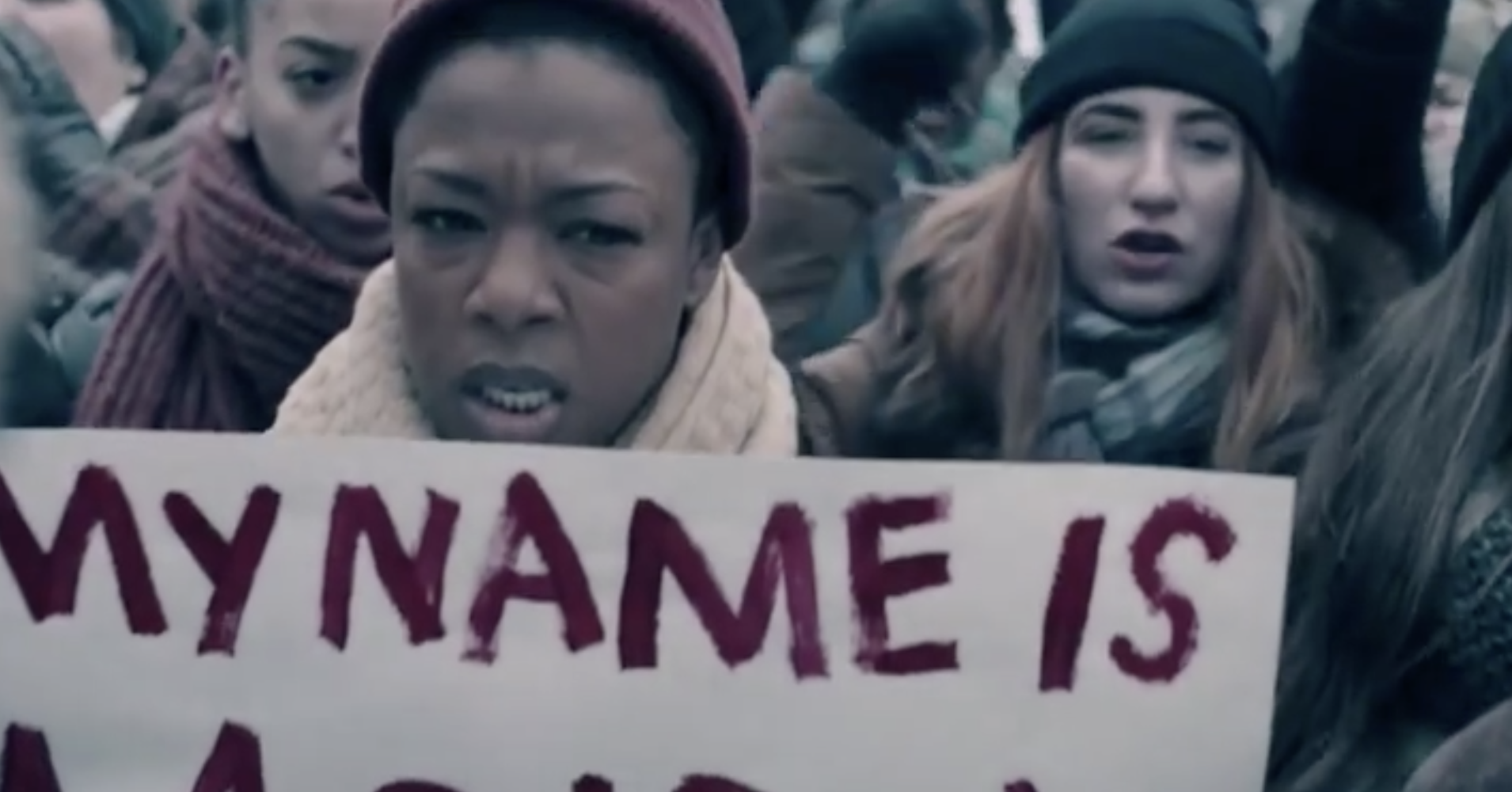[ad_1]
Warning: Spoilers for “The Handmaid’s Tale” below!
Has hope finally come to “The Handmaid’s Tale”?
Season 2, Episode 9 sees Commander Waterford (Joseph Fiennes) and Serena Joy (Yvonne Strahovski) travel to the Great White North for diplomatic talks. The commander is there as a negotiator. Serena, whom he’d whipped with a belt just days before, is forced to accompany him to show the world what a “strong Gilead wife” looks like.
During their stay in Canada, Serena is faced with the opportunity to turn her back on Gilead permanently ― in the form of a very handsome American official named Marc (Sam Jaeger) ― and Commander Waterford is forced to look both Luke (OT Fagbenle) and Moira (Samira Wiley) in the eyes.
Meanwhile, in Gilead, Rita (Amanda Brugel) and June (Elisabeth Moss), whom Serena has decided will leave the Waterford house as soon as the baby is born, are left at the mercy of a young, vicious Guardian named Isaac. During the Waterfords’ time away, June enlists Rita and Aunt Lydia to protect her child from the commander.
But arguably the episode’s most affecting confrontation is between Nick (Max Minghella) and Luke. The two men who love June are brought together, and it is their shared efforts that get the stories of Gilead’s women out into the world. When Nick returns and tells June that Luke is alive and Moira has done the impossible and escaped, that hope ― and righteous anger ― is transferred to June. Resist, sister.
Emma: This episode, we got an Airbnb joke, a hot new American official and a Rihanna song over the credits (just one week late, Laura)! Is this what “having it all” looks like as a viewer of “The Handmaid’s Tale”?
But, jokes aside, movement is continuing in and out of Gilead, and it feels like hope ― real, somewhat longer-lasting hope ― might finally be present in this show. I know we started off the season talking about what a terrifying chore it is to watch “The Handmaid’s Tale,” but I have to admit that every week that passes I get more and more into it. Initial thoughts?
Laura: I just finally stopped crying for long enough to have some thoughts.
This was my favorite episode of the season so far. We can finally hate Serena! She had some moments of empathy in earlier episodes, some moments of compassion ― but now we see that her eyes are fully open to what Gilead is. She knows that she is complicit in the systematic rape and captivity of other women and that she herself is being oppressed. She knows the religious justifications of the regime are bullshit. She is given an out: A very hot American man offers her a trip to Hawaii and a chance to speak out against Gilead, which would free her and so many other suffering women from a brutal patriarchal regime. And what does she say? “So far, all you’ve offered me is treason and coconuts.”
Then she throws her Hawaii-themed matches into the fire, signifying that she’s made her choice. She’s going to uphold the regime. She’s fully complicit. We don’t have to try to sympathize with her anymore.

Hulu
Emma: Maybe I’m a sucker, but I’m still incredibly intrigued by and even empathetic toward Serena. It would be too easy to have her break with Gilead so quickly. As we’ve discussed, she is likely ultimately irredeemable. And yet… This episode is filled with little moments that bely the cracks in Serena’s Strong Gilead Wife facade. She is close to tears for most of the scenes she’s in. She flinches when Fred touches her shoulder and asks her to accompany him to Canada on a diplomatic mission. Her face lights up when she sees the freedom of movement and choice that the women of Canada still have ― to work, to make out in the streets, to walk around with their daughters and raise them however they please. And her face falls when she sees the way Canadian people treat her ― a mother and daughter don’t even want to share an elevator with her.
Serena is not used to being a pariah, but now she certainly is one, both outside of her country and inside her own house. She’s so very alone. But, being Serena, instead of reaching out for a lifeline or an ally, she digs her heels in. That’s why she throws away the Hawaiian matches that U.S. official Marc gives her, matches that have a phone number on them that she could call for a potential escape route.
And that’s also why she decides that Offred must go as soon as possible. I’m sure she sees June as the corrupting force that made her feel unfulfilled by her circumstances. They worked together and forged a friendship, and now the feelings those things elicited can’t be taken back. Serena’s eyes are fully opened, but she’s not yet strong enough (and far too stubborn) to go back on the system she’s dedicated her life to creating. I don’t sympathize with her, but I do still have some empathy left.
Also, can we talk about how the dynamic between Serena and the commander has shifted? The whole episode it felt like he was trying to get her back on his side, reassure her somehow. He says they’re “lucky.” He gives her responsibility, tries to make her feel valued: “Canadians think women here are oppressed, that they’re voiceless,” he says. “I need you to show them a strong Gilead wife.” And yet … don’t all of those statements land so differently now that he’s made it clear that he is capable of and willing to commit violence against her?
Laura: Yes, something has clearly changed between the commander and Serena since he viciously beat her. I think the purpose of that beating was to remind her that she is, in fact, his property, not his equal. And it did have that effect. And now he’s asking for the strong Serena back, the one who helped him make Gilead what it is, because he recognizes that Gilead cannot survive if there aren’t any strong female voices willing to defend it and to uphold its lies.
But Serena, for now, seems to be have been beaten into submission and silence. She doesn’t say much during this episode ― she accompanies the commander to Canada, but she isn’t the same activist Serena from pre-Gilead times that captivated the room and made her voice heard. Instead, it’s the Jezebels who end up speaking the loudest from Gilead and having the most impact, giving “The Handmaid’s Tale” its first Me Too moment of the series.
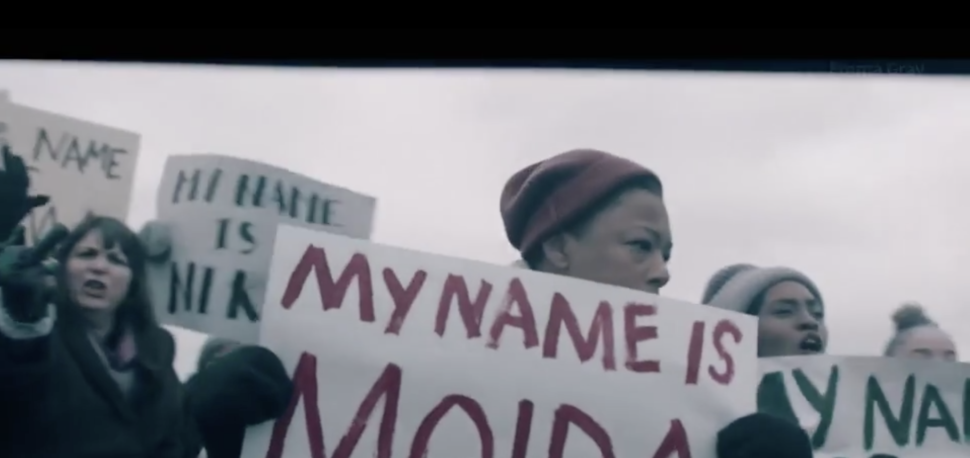
Hulu
Emma: That scene absolutely wrecked me. We see hundreds of women, presumably former Gilead citizens, holding up signs around the commander’s security detail that say “I AM ____” with their names. These women are angry. They’re yelling, and a few even throw things at the cars. The signs are significant because in Gilead, women are wives or Marthas or aunts or handmaids. But outside of Gilead, they’re human beings with distinct identities.
Before I dive into my thoughts on the protests, though, I just have to comment on how eerie it was to watch this episode against the backdrop of President Trump entering diplomatic talks with North Korean dictator Kim Jong Un and engaging in a war of words with Canadian Prime Minister Justin Trudeau. Not a direct parallel, but still a dark reminder of what’s at stake on a human level when world leaders come together or part ways. (I was especially struck by the reminder by the American ambassador that Moira and Luke and all the Gilead refugees are simply guests of the Canadian government. Before this episode it hadn’t occurred to me that they could simply be deported back to Gilead.)
But back to the protests: To me ― and judging from the way we were both sobbing during these scenes, you might agree with me ― these were the most affecting moments of the episode. We finally got to see what it looked like when the most powerful in Gilead are forced to confront their nation’s former citizens. Except this time, as the commander comments, these people cannot be controlled. They are not bound by the oppressive rules of Gilead. They’re free to speak up.
Earlier in the episode, Moira wonders what good it will do to speak out. And yet, it’s the stories of people in Gilead that end up making a real difference and forcing the Canadian government to take deportation of illegal immigrants and trade off the table. Nick (bless his hot little face) gets the letters that June had been holding on to for months to Luke, and Luke in turn gets them published.
Overnight, a public uproar erupts and ultimately changes the direction of diplomatic talks. Canadian citizens speak out, Gilead refugees speak out, and hundreds of former Gilead citizens gather around the commander’s car as it leaves for the airport. They’re all holding signs with their real names. I fully wept when Moira reclaimed her name, holding her I AM MOIRA sign in front of Fred’s window, forcing him to see it.
“Not Ruby, asshole,” she mutters under her breath. And I honestly think even the commander looked rattled in that moment.
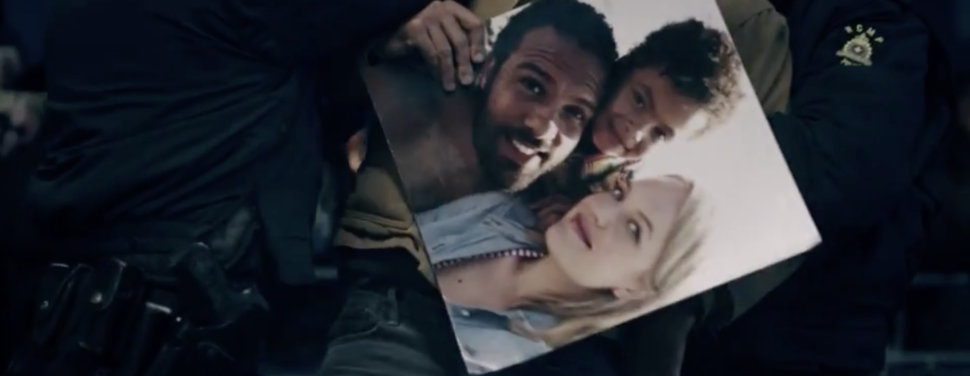
Hulu
Laura: The moments that affected me the most were when Luke held up the giant photo of himself and June and their baby, forcing the Waterfords to confront the real woman that they enslaved. And the conversation between Luke and Nick, when Nick finally tells Luke that June is pregnant (though he lies about whose baby it is), was so incredibly heartbreaking. We finally see these two very different worlds colliding in the form of two men who are genuinely both in love with June, and Nick seems to realize in that moment that he has no right to her at all, because their relationship was only enabled by her abduction and captivity. Talk about a tragic-ass love triangle.
I think another reason this episode is so affecting is that the writers have done a really good job situating Gilead in the present moment and forcing us to feel what it would be like to have a society like that existing today. There are references to Airbnb and H&M in this episode, making it clear that this is all occurring in the present day. So when the Jezebels are finally able to get their stories out to the world, you really feel these parallels between them and all the real-life women who have finally come forward in the past year to hold men accountable for years of sexual harassment and abuse.
In that way, this episode really explores the idea of protest. We saw in an earlier episode the handmaids use force as a means of rebellion; a woman strapped a bomb to herself and attacked Gilead. But it didn’t seem to have much effect at all. Here, we get the sense that it’s actually these women’s voices and their stories rather than a bloody revolution that may be able to bring down Gilead once and for all.

Hulu
Emma: Such a good point! The commander even says that the terror attack is what opened up diplomatic possibilities for Gilead. Those letters ― those stories ― are what shut them down.
I found myself really unsettled watching the way Canadians reacted to these Gilead officials. It made me wonder if that’s sort of the way people are starting to see us, Americans, from the outside. That’s part of the oddity of watching this show. Obviously we feel as though our stand-ins are the handmaids, but is Serena kind of our stand-in as well? I’ll be thinking about that for the next week.
One more thing I wanted to say about Serena is that we might have been tipped off to the messaging that could eventually break her. Marc mentions the lies her husband’s government perpetuates about women’s fertility, and despite the fact that she already knows Fred is the infertile one, it seems to get to her. “Gilead blames the fertility crisis on women, their sinfulness,” Marc says. “We see the problem often originating with men.”
He also suggests that American scientists ― who we can only assume are all gathered between Alaska and Hawaii ― have made strides in the years since Gilead was established. “Now think of it ― a baby of your own. And freedom,” Marc says. I believe that vision is seductive to Serena, even if in the moment she insists that she has a child on the way and would never leave her home.
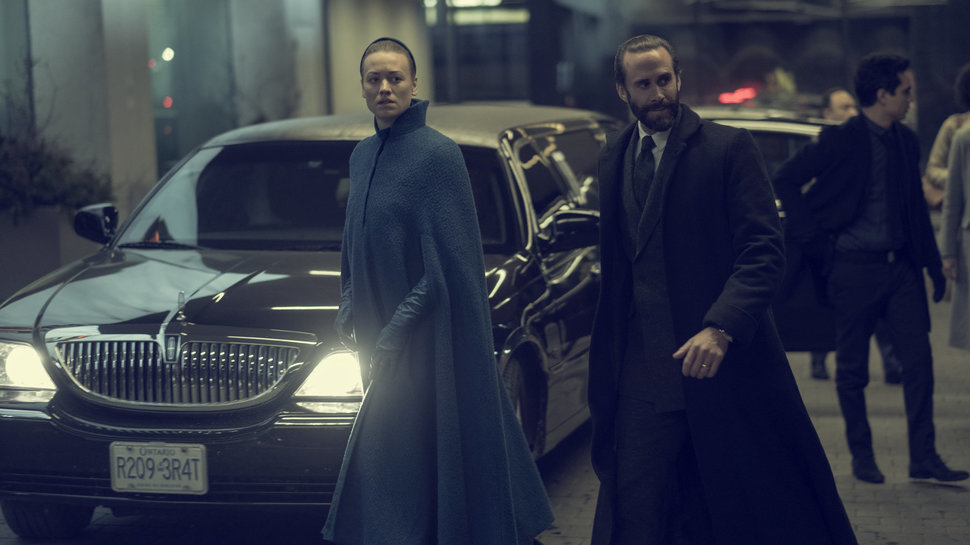
Hulu
Laura: Yes! Not to get all college film class on you, but I did take one of those, and I wanted to note the use of cigarettes in this season as a symbol of Serena’s various temptations. She throws the matches into the fire, but she hangs on to the cigarettes, suggesting I think what you said ― that a part of her is still curious and tempted by the alternate life that Marc laid out in front of her.
Meanwhile, in Gilead, June is starting to plan for the possibility that her baby might actually grow up in this horrifying theonomy with Serena as a mother and a wife-beating rapist for a father. She asks Rita and ― gasp! ― Aunt Lydia to be the baby’s godmothers. We see a moment of tenderness between June and Lydia, who has been a lot kinder to her since she became pregnant and has even shown some maternal moments.
But man, how desperate do you have to be to ask a woman who literally burned a girl’s hand off on a stove and kept you chained to a bed to be your baby’s godmother? Dystopia indeed.
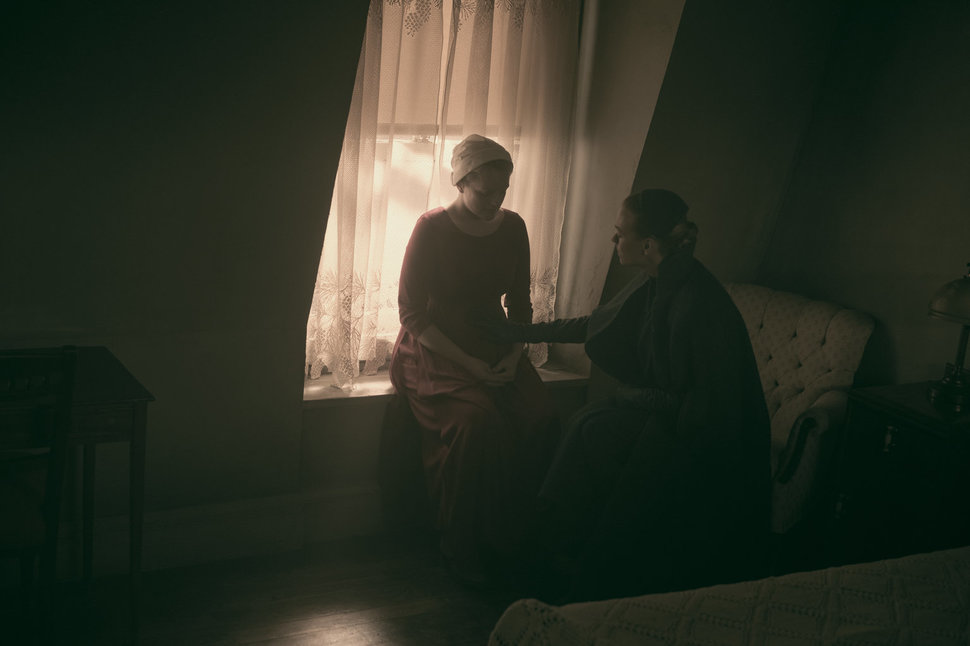
Hulu
Emma: Pretty damn desperate ― or at least smart enough to recognize that Aunt Lydia is a true believer, and that means she’s a true believer in the sacredness of children. I’ve said this before, but we so badly need an Aunt Lydia flashback episode. We get our first allusion to the pain that exists in her past when she discloses to June that she had been the godmother to her sister’s child, but he died when he was just 4 days old. “Sorry,” says June. And Lydia’s response is so odd and so off and so telling: “It wasn’t my fault.”
The other overarching message of this episode seemed to be about patriotism. What does it look like to betray your country? (As Serena swears she’d never do, and Marc insists she already has.) What does it look like to love your country? To me, the most patriotic moment of the episode, and honestly the series, was the protests. In the aftermath, Moira and Luke hold a gathering of refugees at their apartment, and someone starts to sing “America the Beautiful.” Suddenly, the whole room is singing.
It reminded me of the day after the 2016 election. I got on the subway to go to work the next morning ― the city felt funereal ― and while I was waiting for the train, an older male busker started singing “America the Beautiful.” I don’t know what it is about that song, but it has the ability to be so gorgeous and so haunting. It broke me then and it breaks me now.
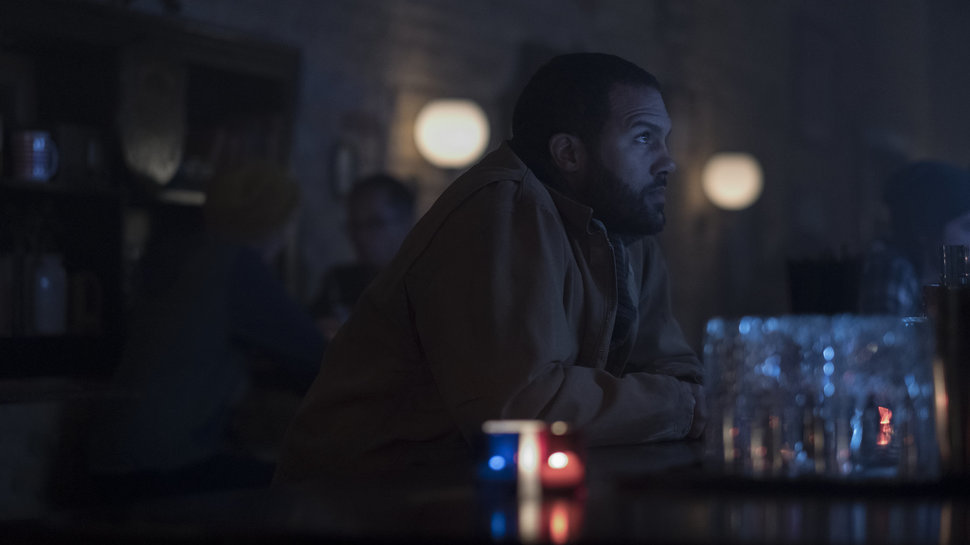
Hulu
Laura: Yes, that moment really gets at the feeling of watching your country fall into dark times. There are even a couple mentions of immigration and border security in this episode to bring home the parallels to our present-day flirtations with fascism.
I like your point about patriotism ― I think it’s especially relevant now, as the debate rages on as to whether it’s patriotic or not for football players to kneel during the national anthem. Can protest itself be patriotic, or should you blindly support your government regardless of how it treats people? This episode strongly makes the case for the former.
Emma: Absolutely. Moira and Luke’s patriotism drives them to protest, and that protest brings them a community of survivors, and ultimately, hope. The beautiful thing about hope is that it’s infectious. Nick brings it back for June, letting her know that Luke is alive and well and resisting, as is Moira. That realization alone lifts June out of her complacency and resignation and back into the fight.
“She got out,” says June’s inner voice, referencing Moira. “It was impossible, but she did it. I know I should expect the reality of you being born here. Make my peace. But fuck that.”
To read more of HuffPost’s “Handmaid’s Tale” coverage, head here.
[ad_2]
Source link

